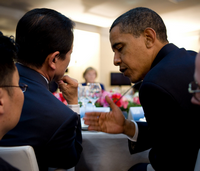Now that the G-20 multilateral format has taken the lead in managing the world economy, many commentators are eager to do away with its predecessor in that role, the Group of Eight (G-8). Such a focus, however, neglects the G-8's important security functions. Since the 1980s, the group has given birth to major initiatives promoting global peace and security. The G-20 lacks the unique assets that have made the G-8 so effective in this area.
The G-8 now includes Canada, France, Germany, Italy, Russia, the European Union, the United Kingdom and the United States. The absence of some of the world's rising economic powers -- such as Brazil, China, and India -- rightly calls into question the G-8's ability to direct the international economy. But the group's membership roster still includes most of the world's great military powers. They account for three-fourths of the world's annual military spending, host the leading defense companies, and even after their recent round of reductions, possess some 90 percent of the world's nuclear weapons.
The G-8's lack of formal rules and procedures has allowed the institution to develop innovative policy responses more easily than the United Nations, NATO, and other highly structured institutions with more complex decision-making processes. The group arose to address the global recession of the 1970s, but in subsequent decades, its members readily included the most important political and security issues on the agenda of its annual meetings. These new areas encompassed energy security, international terrorism, regional conflicts, and nonproliferation threats. In recent years, managing climate change and the other wide-ranging and often-unanticipated effects of globalization have occupied prominent places on its agenda.

